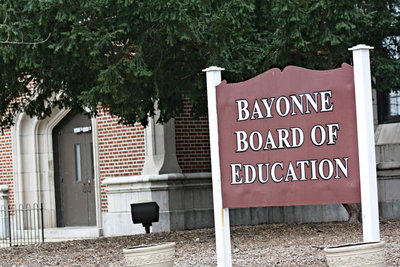Contract negotiations for 750 teachers and 50 secretaries in the Bayonne school district were thrust into the public when the details of the district’s contract offer were released.
Alan D’Angelo, president of the Bayonne Teachers’ Association, said this public disclosure might be an unfair labor practice, but he continued to contend that the contract offer is unfair to teachers.
The move appears to have been an effort by the school district to bypass the negotiating committee and take the offer directly to the teachers.
“They (the school district) were hoping that the teachers would call me to demand that we accept the terms,” D’Angelo said. “So far nobody has called me, and that’s because it is a bad contract they are offering, and teachers would rather have nothing than a bad contract.”
According to a public statement issued to teachers by the Bayonne Board of Education a few days before Easter, the offer was a fair proposal that teachers should consider.
The district and the teachers’ union are negotiating a four-year contract, three of which have already passed. The district has offered teachers a contract that would include a zero increase for the first year, a zero increase for some teachers in the second year, and a two-percent increase in the remaining two years. The district has also proposed increasing the number of steps (years) in the salary guide from 15 to 19, which would delay by four years a teacher’s ability to reach maximum salary.
Currently, teachers work at a significantly lower rate at the start of their careers, putting off the large increases until the later steps. Currently, the potential salary for a teacher goes from about $49,000 in the first year, increasing gradually during the first 12 steps until the 13th step at which point they could see an increase of as much as $9,000. At the 14th step, the increase would be as much as $12,000, and by the 15th step, as much as $15,000.
This allows the district to give very low increases during the early steps. The average is about $200 per year for the first 12 years, with the promise that teachers would make up for the lower wages in the last steps.
The union did agree to these steps in previous contracts, but D’Angelo said he would prefer a system that would spread out the increases more evenly. The school district’s proposed changes were unacceptable, he said, because spreading out the later increases further delays the full payout at the end.
School district officials said D’Angelo asked for a 17.85 percent increase in salaries over four years, a figure D’Angelo confirmed.
“That was what I asked when we started negotiating this contract three years ago,” D’Angelo said. “I haven’t lowered it because the district offered a zero increase. If they had changed their offer, I would have changed mine. I see no point in asking for less if they weren’t willing to offer more. I’m not negotiating with myself.”
District officials said they cannot afford the contract increases because the step guide was based on projections of increased state aid, which was cut back significantly, and they claim the union is willing to see as many as 120 teachers laid off, increases in class sizes, the elimination of all sports teams, clubs, after-school activities and extracurricular programs, non-maintenance of facilities, and significant tax increases for the residents of Bayonne.
D’Angelo said these claims were distorted and that the union wants payment of salaries and a fair contract offer as a priority in the budget. While the Bayonne School Board voted a 2-percent increase in this year’s $121 million budget (meeting a cap set by the state), the board failed to do that in prior years.
“Had the board voted for a 2-percent increase in 2010-2011 like they did this year, we could have settled this contract,” D’Angelo said.
Had the district settled the contract in the first year, he said, the district would have seen the lowest teacher contract since 1980.
This would have meant a 1 percent increase to the taxpayers because the school budget is part of an overall municipal budget.
“When we started this, we had fewer teachers on the later steps so it would have had a lower impact,” D’Angelo said. “Going into the fourth year, we have more teachers on the bubble,” meaning years 12 and 13.
But he said that he believed the district would not have to increase taxes if the Board of Education gave priority to teacher salaries and cut back in other areas.
School Business Administrator Leo Smith said the district is faced with a number of demands and loss of revenue from the state as well as a massive loss in revenue from its solar-power installations. The district also has aging buildings in need of repair. Meanwhile, the school district has seen an increase in enrollment over the last few years, forcing it to hire new teachers. While this increase in the number of teachers as been offset somewhat by retiring teachers, not enough to realize a cost benefit in the budget.
But D’Angelo said the teachers aren’t asking for much, and many teachers will get less money even with the increase in salary a new contract will provide because they will have to pay for their own health benefits.
“They tell us that the state cut their aid,” D’Angelo said. “But they still have an obligation to run the district. They have to make up for the lost aid, and I can’t see teachers getting hit on the head. We’re doing our job. They are getting what they want without paying us. Our teachers feel for their kids and do not want them to suffer because of this.”
Al Sullivan may be reached at asullivan@hudsonreporter.com
